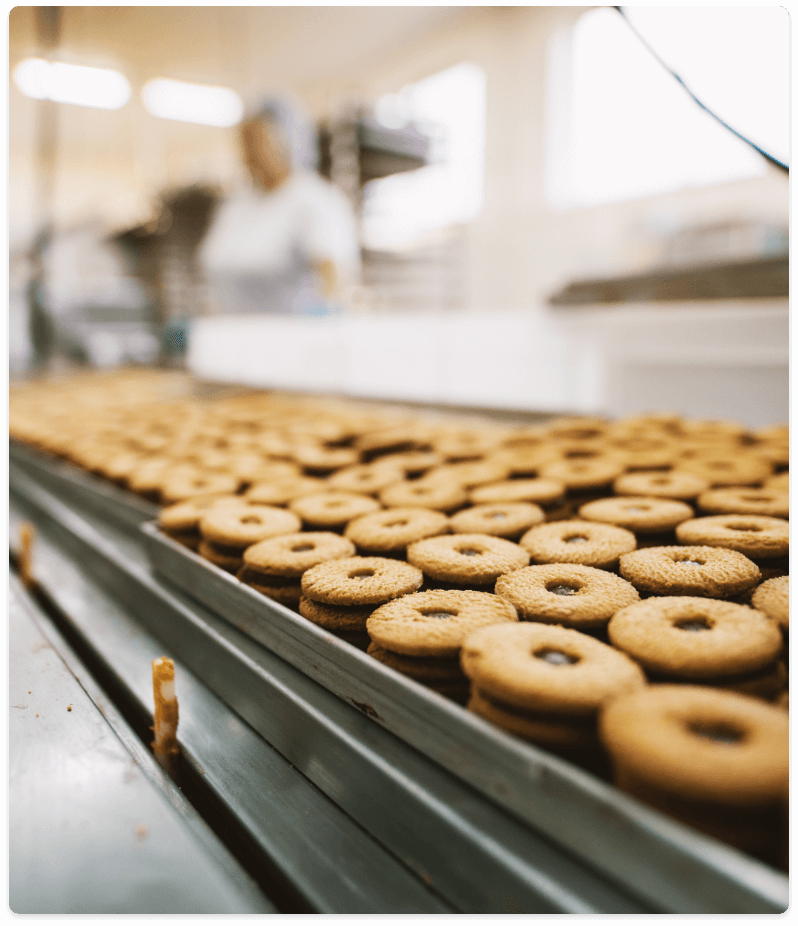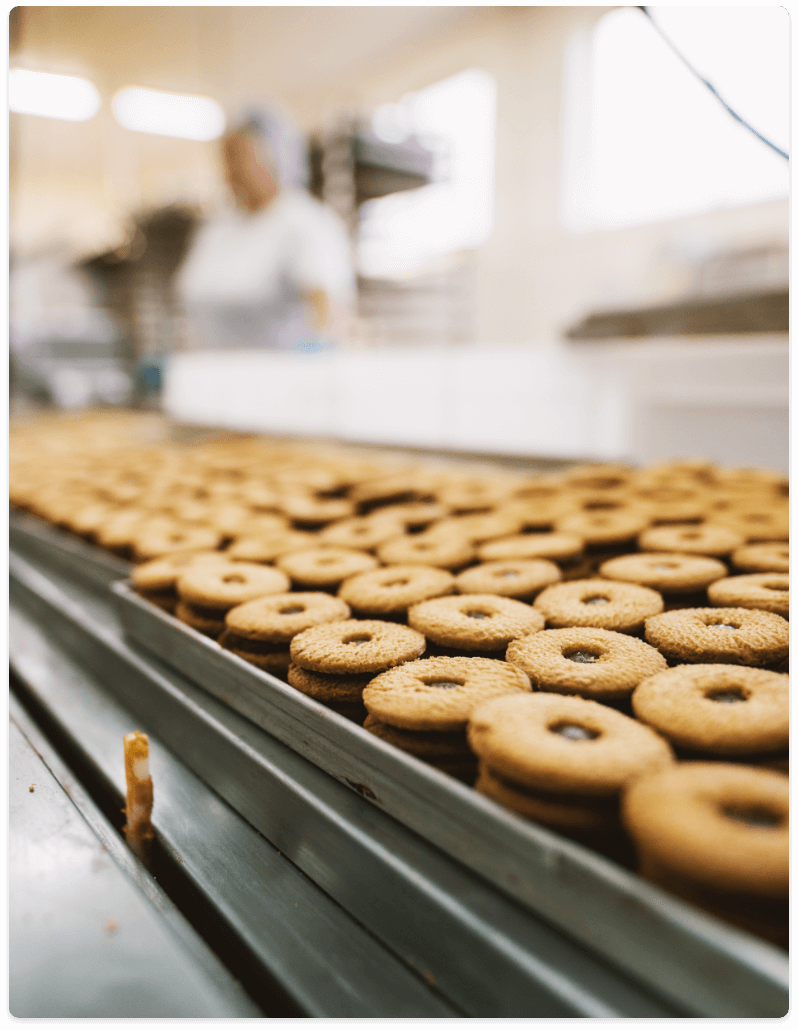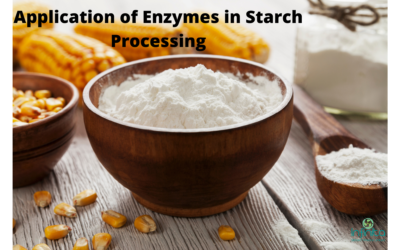Bakery Enzymes Manufacturer

Baking comprises the use of enzymes from three sources: the endogenous enzymes in flour, enzymes associated with the metabolic activity of the dominant microorganisms and exogenous enzymes which are added in the dough. The use of bakery enzymes as a supplement to the flour and dough has been generally followed and has also been used for flour standardization.
Bakery Enzymes are usually added to modify dough rheology, gas retention and crumb softness in bread manufacture, to modify dough rheology in the manufacture of pastry and biscuits, to alter product softness during cake production and to reduce acrylamide formation in baked goods. The Bakery enzymes can be added individually or in complex mixtures, which may act in a synergistic way in the production of baked goods, and their levels are usually very low.
Extra enzymes added to the dough improve control of the baking process, allowing the use of different baking processes, reducing process time, slowing-down staling, compensating for flour variability and substituting chemical additives
With our range of bakery enzymes, the softness of the bread remains intact and the shelf life is extended. The increase in softness results in relatively few returns of stale bread, which helps to control inventory and logistics of delivery, thus reducing bread waste. Using our enzymes imparts a fluffier, more flavorful texture to muffins, pound cakes, heavy cream cakes, sponge cakes, and more. It also stays fresh and soft for a long time.
In addition to their various benefits in baking, bakery enzymes have also played a crucial role in fostering collaboration between yeast manufacturers and the development of bread flour improvers. These enzymes have enabled yeast manufacturers to enhance their products’ performance by optimizing fermentation and gas production during the bread-making process. By working in synergy with bread flour improvers, bakery enzymes aid in achieving consistent dough rheology, improved gas retention, and ultimately, superior bread quality. This collaboration has paved the way for innovative solutions that address the challenges faced by both yeast manufacturers and bakers, resulting in bread products that boast enhanced texture, extended shelf life, and reduced waste.
Baking comprises the use of enzymes from three sources: the endogenous enzymes in flour, enzymes associated with the metabolic activity of the dominant microorganisms and exogenous enzymes which are added in the dough. The use of bakery enzymes as a supplement to the flour and dough has been generally followed and has also been used for flour standardization.
Bakery Enzymes are usually added to modify dough rheology, gas retention and crumb softness in bread manufacture, to modify dough rheology in the manufacture of pastry and biscuits, to alter product softness during cake production and to reduce acrylamide formation in baked goods. The Bakery enzymes can be added individually or in complex mixtures, which may act in a synergistic way in the production of baked goods, and their levels are usually very low.
Extra enzymes added to the dough improve control of the baking process, allowing the use of different baking processes, reducing process time, slowing-down staling, compensating for flour variability and substituting chemical additives
With our range of bakery enzymes, the softness of the bread remains intact and the shelf life is extended. The increase in softness results in relatively few returns of stale bread, which helps to control inventory and logistics of delivery, thus reducing bread waste. Using our enzymes imparts a fluffier, more flavorful texture to muffins, pound cakes, heavy cream cakes, sponge cakes, and more. It also stays fresh and soft for a long time.
In addition to their various benefits in baking, bakery enzymes have also played a crucial role in fostering collaboration between yeast manufacturers and the development of bread flour improvers. These enzymes have enabled yeast manufacturers to enhance their products’ performance by optimizing fermentation and gas production during the bread-making process. By working in synergy with bread flour improvers, bakery enzymes aid in achieving consistent dough rheology, improved gas retention, and ultimately, superior bread quality. This collaboration has paved the way for innovative solutions that address the challenges faced by both yeast manufacturers and bakers, resulting in bread products that boast enhanced texture, extended shelf life, and reduced waste.

Our Solutions
Fungal Alpha amylase
Enzyme to enhance Fermentation process and to give high loaf volume.

Enhances Fermentation Process

Improves Bread Volume

Improves Crumb Texture

Enhances Fermentation Process

Improves Bread Volume

Improves Crumb Texture
Gluco amylase
Enzyme for optimum dough crumb and crust colours for baked products.

Accelerates Yeast Fermentation

Optimum Dough Expansion

Intense Flavour And Colour

Accelerates Yeast Fermentation

Optimum Dough Expansion

Intense Flavour And Colour
Maltogenic amylase
Enzyme specially designed for improving shelf life and crumb softness.

Improves Shelf Life

Prevents Storage Retrogradation

Reduces Spoilage

Improves Shelf Life

Prevents Storage Retrogradation

Reduces Spoilage
Lipase
Modification of natural lipids in flour to strengthen the dough.

Increases Dough Tolerance

Improves Loaf Volume

Decreased Stickiness

Increases Dough Tolerance

Improves Loaf Volume

Decreased Stickiness
IMPROVERS
Enzyme based improvers designed for all types of baked goods

Enhances overall quality

Versatile uses

Offers consistent baked goods

Enhances overall quality

Versatile uses

Offers consistent baked goods
Xylanase
Enzyme based improvers designed for all types of baked goods

Enhances overall quality

Versatile uses

Offers consistent baked goods

Enhances overall quality

Versatile uses

Offers consistent baked goods
Related Articles
Lipase Enzyme – Overview and Application of Lipase
Enzymes have been used for different purposes since ancient civilisations. Today, there are almost 4000 enzymes, and nearly 200 are in commercial use. About 75% of all industries' enzymes (including lipase) are hydrolytic, and most industrial enzymes are of microbial...
Enzymes Used in Treatment for Wastewater
Water like air is one of the necessities for humans and other living organisms alike. Without water, we cannot function. It is even projected that the third world war may be fought over water resources. Our water reservoirs including rivers, perennial or seasonal...
Application Of Enzymes In Starch Processing
Application Of Enzymes In Starch Processing Enzymes are proteins that are a constituent of all living beings. They act as catalysts in humans, animals, plants, and microorganisms. Enzymes, as catalysts, are compounds that increase the rate of a chemical reaction in...
FAQ’S
What is the role of alpha-amylase in Baking?
In baking, alpha-amylase helps to break down the starches in flour into sugars. This makes the dough easier to work with and helps to create a light and fluffy finished product.
What is fungal alpha-amylase?
Fungal alpha-amylase is an enzyme that catalyzes the hydrolysis of starch into maltose and glucose. It is used in baking as a dough strengthener and to control the rate of starch conversion into sugar. Fungal alpha-amylase is also known as glucoamylase.
What are the enzymes used in the bakery industry?
Enzymes such as Fungal Alpha Amylase, Gluco Amylase, Maltogenic Amylase and Lipase are used for everything from dough development to shelf life.
What is glucose amylase used for?
Gluco amylase is an enzyme produced by bakery enzymes manufacturers to break down starch into maltose and glucose. This enzyme is often used in the baking industry to help produce a more consistent and predictable end product. It can also be used to improve the texture and flavor of baked goods.
What is Maltogenic amylase?
Maltogenic amylase is an enzyme that catalyzes the conversion of starch to maltose. It is produced by the fungus Aspergillus oryzae, and is used in the brewing and baking industries to produce maltose from starch. Maltogenic amylase is also used by maltogenic amylase manufacturers in the production of biofuels, and as a food additive to improve the texture and flavor of food products.
What are the applications of lipase in the food industry?
Lipase is a type of enzyme produced by bakery enzymes manufacturers that catalyzes the hydrolysis of lipids. In the food industry, it is used to improve the taste and texture of food products, as well as to increase the shelf life of food items. Lipase is also used in the production of biodiesel fuel.
Looking For Enzymes?
We’re Here To Help
Looking For Enzymes?
We’re Here To Help

QUICK LINKS
HOME
ABOUT
CERTIFICATIONS
BLOGS
MEDIA
CAREERS
FAQs
CONTACT
PRODUCTS
© 2024, Infinita Biotech Private Limited. All rights reserved.
Designed by Kerkar Media


